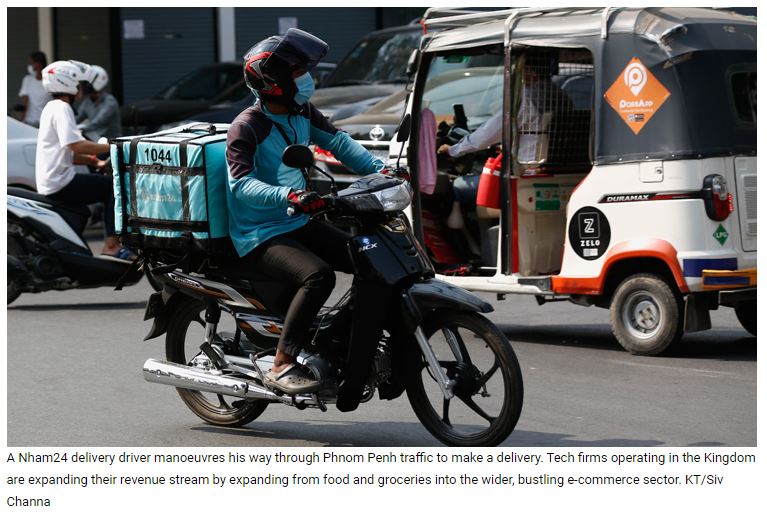Cambodia: Tech firms taking larger slice of the nation’s e-commerce pie
Businesses are forging symbiotic platforms to gain a piece of the Kingdom’s growing e-commerce sector, while challenging Facebook’s dominance in the industry.
The Kingdom’s e-commerce sector generated $182 million last year and is projected to grow by 21.4 percent to reach $222 million this year, according to Statista, a German company that specialises in market and consumer data.
Nham24, most known as a food delivery platform in Phnom Penh and Siem Reap, is among those to enter the fray. The firm has broadened its offerings to include medicine, electronics, cosmetics and even flowers during the pandemic.
Its head of marketing, Simon Lam, said Nham24 was leveraging the platform’s popularity to help sellers wean themselves off their dependence on Facebook.
“At the moment, most e-commerce in Cambodia takes place on Facebook because there is no solid alternative,” said Lam.
“Most of the merchandise sold on Facebook is purchased from Thailand or China and sellers have to pay increasingly expensive fees to promote their products on that platform because sellers have to outbid each other,” he added.
The Facebook Shops platform was released in May and was introduced to the Cambodian market two months later.
“Across the globe, many small businesses are struggling. With stores closing, more are looking to take their business online. Now, people in Cambodia can find Facebook Shops on a business’ Facebook Page or Instagram profile, or discover them through stories or ads,” a news release issued by the social media company said.
Initially lauded for allowing small and medium-sized businesses to reach new customers during the pandemic, Facebook is now facing criticism for its increasingly expensive advertising fees and a lack of training for vendors.
Lam said that his firm circumvents that by allowing companies to list their products on Nham24 free and helps entrepreneurs market their goods to aid them in increasing sales. Moreover, Nham24’s strategic advantage over competitors may be its ability to provide last-mile delivery – something other firms must either develop from scratch or outsource.
“Providing an easy-to-use and effective e-commerce platform for Cambodians was a simple extension of our food delivery model. We can work with any store the same way we work with restaurants,” he said.
TrueMoney Cambodia has also diversified its case-use scenarios to include e-commerce, taking on Facebook more directly through its app.
Its Chief Strategy Officer Frandara Khuon said that while remittance transfers remain its most popular case-use, the company had seen “major growth” in its e-commerce business.
The Thailand-based firm not only provides a platform to vendors but also helps train sellers in search engine optimisation and marketing techniques, Frandara said.
“The pandemic has accelerated online purchases and there has been a noticeable impact on business. People are avoiding paying with cash and this has been driven in partnership with the NBC [National Bank of Cambodia], which asked us to help convert physical payments to cashless transactions,” Frandara said.
“Our online marketplace is designed to help micro and small to medium-sized enterprises reach out to new customers and help them avoid having to pay fees to increase their reach. We offer training for free to vendors and a way to reach new audiences.”
Source: https://www.khmertimeskh.com/50816980/tech-firms-taking-larger-slice-of-the-nations-e-commerce-pie/


 English
English




